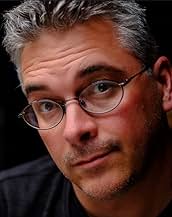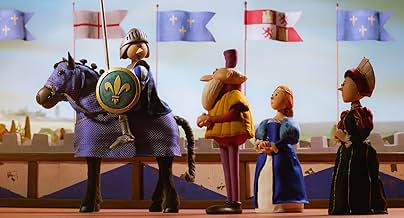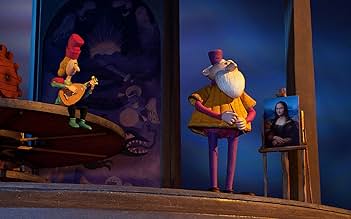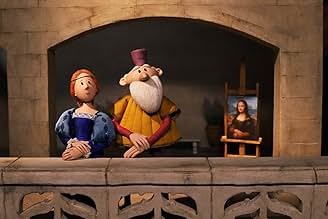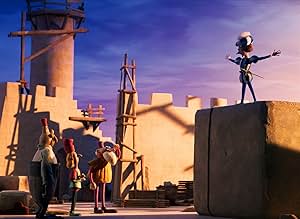NOTE IMDb
5,7/10
819
MA NOTE
Inventant des engins volants, des machines de guerre et étudiant des cadavres, Léonard de Vinci s'attaque au sens même de la vie avec l'aide de la princesse française Marguerite de Nevarre.Inventant des engins volants, des machines de guerre et étudiant des cadavres, Léonard de Vinci s'attaque au sens même de la vie avec l'aide de la princesse française Marguerite de Nevarre.Inventant des engins volants, des machines de guerre et étudiant des cadavres, Léonard de Vinci s'attaque au sens même de la vie avec l'aide de la princesse française Marguerite de Nevarre.
- Réalisation
- Scénario
- Casting principal
- Récompenses
- 1 victoire et 3 nominations au total
Daisy Ridley
- Marguerite
- (voix)
Matt Berry
- Pope Leo X
- (voix)
Aaron Heffernan
- Crowd
- (voix)
Ben Stranahan
- Page
- (voix)
Jim Capobianco
- The Physician
- (voix)
- …
Marion Charrier
- Annette
- (voix)
Elodie Collins
- Crowd
- (voix)
Audrey Flory
- Crowd
- (voix)
Avis à la une
I just watched The Inventor, and I must say, it's a captivating animation film that left me pondering the life of Leonardo da Vinci. As someone who's always been fascinated by art, science, and history, I appreciated the unique blend of these elements in the movie.
One of the standout aspects of The Inventor is its stunning animation. The watercolor-inspired visuals transported me to the Renaissance era, immersing me in the world of 15th-century Florence. The attention to detail in the characters' designs and the environments is impressive, making every scene a feast for the eyes.
The storytelling is engaging, and I enjoyed seeing Leonardo's curiosity and creativity shine through. The film highlights his inventive spirit, showcasing his iconic designs and innovations. However, I felt that the narrative was a bit disjointed at times, jumping between different periods of Leonardo's life without clear transitions.
My only other criticism is that the supporting characters feel somewhat one-dimensional. I would have loved to see more depth and development in characters like Lorenzo and Francesco.
Despite these minor flaws, The Inventor is a charming film that sparked my interest in Leonardo's life and work. The movie's themes of creativity, perseverance, and innovation resonated with me, and I found myself reflecting on my own passions and pursuits.
Overall, I'd recommend The Inventor to anyone interested in art, history, or science. While it may not be a perfect film, its unique visual style and captivating storyline make it a worthwhile watch.
One of the standout aspects of The Inventor is its stunning animation. The watercolor-inspired visuals transported me to the Renaissance era, immersing me in the world of 15th-century Florence. The attention to detail in the characters' designs and the environments is impressive, making every scene a feast for the eyes.
The storytelling is engaging, and I enjoyed seeing Leonardo's curiosity and creativity shine through. The film highlights his inventive spirit, showcasing his iconic designs and innovations. However, I felt that the narrative was a bit disjointed at times, jumping between different periods of Leonardo's life without clear transitions.
My only other criticism is that the supporting characters feel somewhat one-dimensional. I would have loved to see more depth and development in characters like Lorenzo and Francesco.
Despite these minor flaws, The Inventor is a charming film that sparked my interest in Leonardo's life and work. The movie's themes of creativity, perseverance, and innovation resonated with me, and I found myself reflecting on my own passions and pursuits.
Overall, I'd recommend The Inventor to anyone interested in art, history, or science. While it may not be a perfect film, its unique visual style and captivating storyline make it a worthwhile watch.
I was quite nervous at the start here when I saw how many production companies were involved - it looked like a recipe for a mess. Well it isn't. It's certainly an amalgam of animated styles featuring everything from flat 2-D drawing to complex technical sketching and some stop-motion characterisations that really worked quite quirkily. It's the briefest of potted histories of the life of Leonardo da Vinci. We start in Rome where his sponsor - Cardinal de Medici - is constantly firefighting for him with Pope Leo X who wants him to do something a little more useful, and not dissect dead bodies in the middle of the night! It's that latter habit that sees him flee to the relative safety of King Francis I of France. The King wants the maestro to build him a castle, or a new city, or some fancy weapons - or probably all of the above. Leonardo doesn't really react well to commissions though, and soon his new benefactor is also beginning to lose his patience. Luckily, he has the princess Marguerite in his corner, and gradually the grudging support of their mother, the Queen. It can look a bit disjointed at times, the art is frequently quite contrasting - but that just makes the whole proposition a little more interesting and innovative. The drawings reminded me a little of the opening titles to Tom Riley's "Da Vinci's Demons" television drama - and the narrative emphasises quite engagingly the visionary nature of a man who quite literally walked a fine line between science, religion and a bonfire! It's probably twenty minutes too long, but once we get going there is plenty of imaginative action to keep it watchable.
Loved it. A VERY good tale of a misunderstood genius using his inquisitiveness to push forward the world or science, up against cynicism, ego, power and the battle with the all-powerful church which saw science as undermining to faith (on which its influence was based). Could have been set... today. Most suited to older children and definitely for adults with a interest in science, arts, innovation and the battle of discovery over power. Some powerful messages in an beautiful animation. It's a lovely mixture of humour, coupled to an authentic look at probably one of the most important stories in our scientific evolution, the work from which still influences today. Congratulations on being bold... just like Leonardo!
Weird negative quote on here about Italians getting English accents. Actually drives me nuts that so many films when aimed at an English-speaking audience have accents that I can't even understand or follow. This one was easy to listen to and the voices suited. Congratulations!!
Weird negative quote on here about Italians getting English accents. Actually drives me nuts that so many films when aimed at an English-speaking audience have accents that I can't even understand or follow. This one was easy to listen to and the voices suited. Congratulations!!
**Review: "The Inventor" - A Visual Symphony of Art and Life**
The magic of cinema takes various shapes and forms, but few as mesmerizing as "The Inventor". The film is not only a love letter to Leonardo da Vinci's later years but also a masterpiece that combines the intricate art of stop motion animation with an emotionally captivating narrative.
From the moment the movie begins, the audience is transported into a breathtakingly crafted world that is not only aesthetically awe-inspiring but also teeming with intricate details. Jim Capobianco, an Academy Award nominee, showcases his prowess by weaving a tapestry of rich, historical narrative that marries fact with fiction, transporting viewers directly to da Vinci's side as he navigates the courts of France, searching for life's meaning.
Da Vinci, voiced by the inimitable Stephen Fry, is portrayed with such depth and gravitas that one could almost forget that they are listening to a voice and not actually sitting across from the genius himself. Fry's performance is both nuanced and powerful, infusing the film with an emotional anchor that draws the audience into Leonardo's world of innovation and introspection.
Marion Cotillard, an Oscar winner, lends her voice to a character that complements and contrasts with da Vinci in a beautiful dance of words and emotions. Daisy Ridley and Matt Berry also shine in their respective roles, adding layers of complexity to this rich tapestry of characters.
But the heart of the film lies in its visuals. Stop motion animation has long been an avenue for cinematic magic, but "The Inventor" elevates it to a new level. Each frame is a testament to countless hours of meticulous work, creating a fluidity of motion that is so lifelike it's staggering. The film's palette, drenched in the warm hues of the Renaissance, only serves to further its beauty, making each scene a work of art in and of itself.
What's even more surprising is how accessible this seemingly adult-centric narrative is for younger audiences. My 8-year-old daughter was completely captivated by it, her eyes glued to the screen from start to finish. While I initially thought the subject might be a tad mature for her, the film seamlessly balances its complex themes with moments of levity and wonder, making it universally engaging.
The underlying theme of the movie - the search for life's meaning - is one that resonates deeply. As Leonardo tinkers with flying contraptions, immerses himself in studies of the human body, and crafts machines that were far ahead of his time, we are left pondering our own journeys and our pursuits of purpose. The film doesn't just tell da Vinci's story; it challenges us to look inward and ask ourselves about our own passions and our quest for understanding.
Moreover, the film's sound design and score cannot be ignored. The intricate layers of ambient sounds, from the rustling of papers to the distant chatter of courtiers, envelop you in a soundscape that's as detailed as the visuals. The score, sweeping and evocative, only adds another layer of depth to this masterpiece.
In conclusion, "The Inventor" is not just a movie; it's an experience. It captures the essence of a man who was centuries ahead of his time, and it does so with grace, beauty, and heart. This is one of those rare films that not only entertains but also educates and inspires. Though it might not resonate with everyone in the same way, it was undeniably a pinnacle of entertainment for me. I'd watch it again and again, relishing in its details, pondering its questions, and simply basking in its visual splendor. Jim Capobianco's "The Inventor" is, without doubt, a cinematic triumph.
The magic of cinema takes various shapes and forms, but few as mesmerizing as "The Inventor". The film is not only a love letter to Leonardo da Vinci's later years but also a masterpiece that combines the intricate art of stop motion animation with an emotionally captivating narrative.
From the moment the movie begins, the audience is transported into a breathtakingly crafted world that is not only aesthetically awe-inspiring but also teeming with intricate details. Jim Capobianco, an Academy Award nominee, showcases his prowess by weaving a tapestry of rich, historical narrative that marries fact with fiction, transporting viewers directly to da Vinci's side as he navigates the courts of France, searching for life's meaning.
Da Vinci, voiced by the inimitable Stephen Fry, is portrayed with such depth and gravitas that one could almost forget that they are listening to a voice and not actually sitting across from the genius himself. Fry's performance is both nuanced and powerful, infusing the film with an emotional anchor that draws the audience into Leonardo's world of innovation and introspection.
Marion Cotillard, an Oscar winner, lends her voice to a character that complements and contrasts with da Vinci in a beautiful dance of words and emotions. Daisy Ridley and Matt Berry also shine in their respective roles, adding layers of complexity to this rich tapestry of characters.
But the heart of the film lies in its visuals. Stop motion animation has long been an avenue for cinematic magic, but "The Inventor" elevates it to a new level. Each frame is a testament to countless hours of meticulous work, creating a fluidity of motion that is so lifelike it's staggering. The film's palette, drenched in the warm hues of the Renaissance, only serves to further its beauty, making each scene a work of art in and of itself.
What's even more surprising is how accessible this seemingly adult-centric narrative is for younger audiences. My 8-year-old daughter was completely captivated by it, her eyes glued to the screen from start to finish. While I initially thought the subject might be a tad mature for her, the film seamlessly balances its complex themes with moments of levity and wonder, making it universally engaging.
The underlying theme of the movie - the search for life's meaning - is one that resonates deeply. As Leonardo tinkers with flying contraptions, immerses himself in studies of the human body, and crafts machines that were far ahead of his time, we are left pondering our own journeys and our pursuits of purpose. The film doesn't just tell da Vinci's story; it challenges us to look inward and ask ourselves about our own passions and our quest for understanding.
Moreover, the film's sound design and score cannot be ignored. The intricate layers of ambient sounds, from the rustling of papers to the distant chatter of courtiers, envelop you in a soundscape that's as detailed as the visuals. The score, sweeping and evocative, only adds another layer of depth to this masterpiece.
In conclusion, "The Inventor" is not just a movie; it's an experience. It captures the essence of a man who was centuries ahead of his time, and it does so with grace, beauty, and heart. This is one of those rare films that not only entertains but also educates and inspires. Though it might not resonate with everyone in the same way, it was undeniably a pinnacle of entertainment for me. I'd watch it again and again, relishing in its details, pondering its questions, and simply basking in its visual splendor. Jim Capobianco's "The Inventor" is, without doubt, a cinematic triumph.
Leonardo da Vinci was one of the most fascinating men who ever lived, but this film fails to do him justice.
Quirkily animated (part puppetry, part cartoon) it centres on the last years of da Vinci's life, when he joined the court of the French King Francis I. His most famous paintings (the Mona Lisa and the Last Supper) are referenced, as are his plans for eccentric machines of war, but we see nothing of their creation.
Instead, the film concentrates on da Vinci's plan for an ideal city (which never got beyond the planning stage) and preparations for an important royal summit.
The latter is presumably meant to be the Field of Cloth of Gold, at which Francis and Henry VIII of England tried to out-do each other in ostentation. For some reason, a third potentate is added - the Holy Roman Emperor Charles V, who was not present. Worse, the film ignores the fact that da Vinci had died the previous year.
There's much to like here. The voice performances are excellent, especially Stephen Fry as da Vinci; and there's a decent amount of humour amidst the philosophising.
Unfortunately, however, the film can't quite make up its mind what it's trying to do. This may be because of the extraordinary number of production companies involved in making it, resulting in a hodge-podge of compromises from a dysfunctional committee.
An interesting film, but ultimately a disappointing one.
Quirkily animated (part puppetry, part cartoon) it centres on the last years of da Vinci's life, when he joined the court of the French King Francis I. His most famous paintings (the Mona Lisa and the Last Supper) are referenced, as are his plans for eccentric machines of war, but we see nothing of their creation.
Instead, the film concentrates on da Vinci's plan for an ideal city (which never got beyond the planning stage) and preparations for an important royal summit.
The latter is presumably meant to be the Field of Cloth of Gold, at which Francis and Henry VIII of England tried to out-do each other in ostentation. For some reason, a third potentate is added - the Holy Roman Emperor Charles V, who was not present. Worse, the film ignores the fact that da Vinci had died the previous year.
There's much to like here. The voice performances are excellent, especially Stephen Fry as da Vinci; and there's a decent amount of humour amidst the philosophising.
Unfortunately, however, the film can't quite make up its mind what it's trying to do. This may be because of the extraordinary number of production companies involved in making it, resulting in a hodge-podge of compromises from a dysfunctional committee.
An interesting film, but ultimately a disappointing one.
Le saviez-vous
- AnecdotesMarion Cotillard voiced Louise of Savoy in both the English and the French version of the film.
- GaffesMichaelangelo is shown painting the ceiling of the Sistine Chapel under the patronage of Pope Leo X.
Michaelangelo was actually commissioned by the previous Pope, Julius II, and had completed the work a year before Leo X was elected.
Meilleurs choix
Connectez-vous pour évaluer et suivre la liste de favoris afin de recevoir des recommandations personnalisées
- How long is The Inventor?Alimenté par Alexa
Détails
Box-office
- Budget
- 10 000 000 € (estimé)
- Montant brut aux États-Unis et au Canada
- 306 385 $US
- Week-end de sortie aux États-Unis et au Canada
- 190 031 $US
- 17 sept. 2023
- Montant brut mondial
- 2 061 835 $US
- Durée1 heure 40 minutes
- Couleur
- Rapport de forme
- 1.85 : 1
Contribuer à cette page
Suggérer une modification ou ajouter du contenu manquant

Lacune principale
What is the Canadian French language plot outline for Léo, la fabuleuse histoire de Léonard de Vinci (2023)?
Répondre


